June 29, 2022
(press release)
–
Kao Corporation, a Japan-based Group whose brand portfolio includes Attack, Bioré, Goldwell, Jergens, John Frieda, Kanebo, Laurier, Merries, and Molton Brown, released progress reports on its ESG (Environmental, Social, and Governance) strategy—the Kirei Lifestyle Plan. Details of its progress is released in the "Kao Sustainability Report 2022." The report discloses the achievements of the key leadership action themes of 2021 as well as the internal carbon price increase to 18,500 yen/ton-CO2 to promote decarbonization. It also outlines revisions made to Kao's biodiversity policy, and details the establishment of the new ESG steering committees, which will strengthen Kao's ESG governance structure. It is available in English on Kao's website from today. For over 130 years, Kao has worked to help consumers lead fulfilling lifestyles. In April 2019, Kao established the Kirei Lifestyle Plan, which is an ESG strategy that includes 19 leadership actions to achieve a sustainable and desirable way of living. The Japanese word 'kirei' describes something that is both clean and beautiful. For Kao, Kirei not only encapsulates appearance, but also attitude—to create beauty for oneself, other people, and for the world around us. Since its start in 2021, the Kao Group Mid-term Plan 2025 (K25) has proclaimed "protecting future lives" and promoting "sustainability as the only path" as its vision. The Kao Group will continue to integrate its ESG strategy into its management practices. It will also develop its business, provide better products and services for consumers and society, and work toward its purpose, "To Realize a Kirei World in Which All Life Lives in Harmony." Kao's ESG Strategy Kirei Lifestyle Plan The Director, Managing Executive Officer in charge of Kao's ESG Division, Dave Muenz, delivered this message regarding the progress of the Kirei Lifestyle Plan announcement: "The expectation of our stakeholders for companies like Kao to help build a more sustainable society is intensifying year on year. Driven by the company's long held value of 'Integrity as the only choice'—doing what is right and holistic even if it may not be the easiest option—Kao has taken steps in 2021 that will help us continue to be a force of positive impact to the people that we serve, including setting ambitious decarbonization goals of aiming for carbon zero by 2040 and carbon negative by 2050. This year, our ESG governance structure has been reinforced by setting up four ESG steering committees that will address decarbonization, plastic packaging, human rights and DEI*1 , and chemical stewardship. As a company dependent on natural capital such as palm oil, we have published a new policy around procurement which will help us work across our supply chain to ensure traceability and identify risks by arranging third-party audits of our suppliers. Kao will continue to work through collaborations and partnerships to create a Kirei Life for all." *1 Diversity, Equity, Inclusion A leading international nonprofit organization, CDP, has included Kao in its prestigious 'A List' across three categories for the second year in a row. Also, the Ethisphere Institute, a leading US think-tank, has named Kao one of the World's Most Ethical Companies for 16 consecutive years. New Initiatives to Promote a Kirei Lifestyle Raising the internal carbon price to 18,500 yen/ton-CO2 to promote decarbonization In 2006, Kao introduced an internal carbon price system to curb CO2 emissions. Last year, it announced a new decarbonization goal and has increased the target rate of CO2 emission reduction from 22% in Scope 1+2*2 CO2 emissions (absolute value) to 55% (taking 2017 as the base year) by 2030. Consequently, Kao has raised the internal carbon price from the conventional 3,500 yen/ton-CO2 to 18,500 yen/ton-CO2*3 . It will also promote the use of energy-saving equipment, the use of equipment with low CO2 emissions, and the procurement of renewable energy. *2 The volume of greenhouse gases emitted directly by business enterprises and other organizations. *3 This rate is the estimated 2035 carbon tax rate, based on the carbon tax rates included in the 2021 IEA World Energy Outlook. It is assumed that in the future, newly introduced equipment will continue to operate after 2030. Establishment of the ESG steering committees to strengthen ESG governance structure Since April 2022, in order to implement ESG initiatives reliably and promptly, the ESG steering committees have been newly established under the ESG Managing Committee to build a flexible and robust ESG governance structure to address the four priority issues of decarbonization, plastic packaging, human rights and DEI, and chemical stewardship. The executive-level leaders serve as the owner, and in conjunction with the ESG Managing Committee, recommendations will be made to each division and Group company. In each division, ESG is incorporated into divisional policies, goals, and plans to build effective governance. ESG governance structures at Group companies overseas are also organized into divisions, and are operated by group companies according to the content of activities. ESG governance structure Revision of biodiversity policy Kao operates by benefiting from many biological resources such as palm oil, paper, and pulp. In 2011, Kao formed the "Basic Policies on Conservation of Biodiversity" and has been working to develop new technologies that contribute to sustainable raw material procurement and biodiversity conservation. The modern world aims to reduce the negative impacts on nature and biodiversity, increase actions that have a positive impact, and reverse the trend of biodiversity loss. With the revision of the global biodiversity goals at the 26th session of the Conference of the Parties, to the United Nations Framework Convention on Climate Change (COP26) in 2021, existing policy has been revised and in April 2022, the "Basic Policy on Biodiversity" was formed. Key Leadership Action Themes: 2021 Activity Results Decarbonization As we work toward the goal of becoming carbon zero (reducing CO2 emissions to net zero) by 2040, and becoming carbon negative by 2050, as well as aiming to reduce CO2 emissions in our own business activities, we also aim to contribute toward realizing a decarbonized society by helping to reduce emissions in society as a whole. We also aim, through carbon fixation, to reduce the amount of carbon dioxide in the atmosphere. Kirei Lifestyle for Everyone—Kao's decarbonization goal 2021 results ● Reduce Scope 1+2*2 CO2 emissions (absolute value) by 55% (taking 2017 as the base year) by 2030 Note: SBTi 1.5°C target certification *4 Volume of CO2 emissions deriving from raw materials procurement, manufacturing, transportation, product usage, and disposal of used products. This covers Scope 1, Scope 2, and part of Scope 3 emissions. ● 100% use of renewably sourced of the electricity by 2030 Note: RE100 participation Responsibly Sourced Raw Materials We source our raw materials in a way that protects natural resources, the environment, and human rights through supply chain traceability and collaboration with suppliers. ■Sustainable palm oil procurement Kao has been taking action to help realize sustainable material procurement of one of its main raw materials― palm oil. Certified (RSPO*5 certified) sustainable palm oil was purchased and support was provided to oil palm smallholders in Indonesia. Kao aims to use 100% RSPO certified palm oil for consumers and industrial applications by 2025. In 2021, the rate of usage was 27%. In 2020, the SMallholder Inclusion for better Livelihood & Empowerment program (SMILE) started in collaboration with Apical Group, a global palm oil processor and exporter, and Asian Agri, a plantation and palm oil company. *5 Roundtable on Sustainable Palm Oil: A roundtable to promote the production and use of sustainable palm oil ● 100% use of certificated paper products and pulp for consumer products by 2025 Inspired by a philosophy of avoiding unnecessary waste, we aim to contribute toward the realization of a zero-waste society by ensuring that used products and product packaging are utilized to the maximum possible extent, if necessary by changing their function. *6 Less used than the previous year *7 The amount of plastic used in Kao's packaging containers and the amount that Kao was involved in resource recovery (the amount of recycled plastic that is converted into valuable products by Kao's original technology + the amount of recycled plastic that Kao used in packaging containers + the amount of plastic Kao collected from society as a whole, which is then recycled, and turned into pellets) is roughly equal. *8 Kao's involvement in plastic recycling is greater than Kao's plastic packaging container usage. *9 Amount of reduction achieved through the use of innovative film-based packaging, refill and replacement products, and development of more concentrated products. To realize a circular society for plastics, we are working on Innovation in Reduction and Recycling through the 4Rs: reduce, replace, reuse, and recycle. ■Promoting the use of refill and replacement packs Usage and reduction volume of plastic in refill and replacement categories In addition, the entire Kao Group, including overseas production, has eliminated the usage of this plastic sticker. Despite it being eye-catching, it does increase the amount of plastic, waste and CO2 at the time of disposal. ■Recycling field tests conducted in collaboration with other companies and organizations Kao Corporation and Lion Corporation began field testing at the Ito-Yokado Hikifune Store in Tokyo from October 2020 and with Welcia Yakkyoku Co., Ltd. from October 2021. Furthermore, to achieve resource circularity in society, Kao, Kobe City, retailers, consumer products manufacturers, and recyclers (resource recycling business operators) have begun collaborating since October 2021, to recycle used refill packs of household and personal care items, as part of the "Kobe Plastic Next: Joining Forces to Recycle Refill Packs" project. (2) Making new bottle containers from used ones: horizontal recycling from bottle to bottle From June 2021, Kao started field testing in Higashi-Yamato City, Tokyo in collaboration with Unilever Japan. Since December, P&G Japan G.K. and Lion Corporation have joined the initiative and the four parties will collaborate to implement the project. (3) Utilizing chemically recycled materials in cosmetic packaging containers Since June 2021, Kao has begun using chemically recycled PET materials for cosmetic bottle containers, such as with the cosmetic brand Twany. Currently, we are conducting (for a limited time) horizontal recycling field testing by collecting used bottle containers then transforming them into new ones. (4) Recycling Used Disposable Diapers In January 2021, Kao and Kyoto University started verification testing in Saijo City to establish a Used Disposable Diaper Carbonization Recycling System. Used disposable diapers will be converted into carbon material, which will help reduce CO2 emissions. We will establish conversion technology for carbon material by 2023 and plan to implement it in society after 2025. (5) The asphalt modifier made from waste PET material: NEWTLAC 5000 The asphalt modifier NEWTLAC 5000, developed in the Kao Chemical Business, does not mix discarded PET material (waste PET), but converts it into a modifier using its own technology. Mixing NEWTLAC 5000 in asphalt improves the durability of pavements by up to five times compared to ordinary pavements. By making the asphalt pavement highly durable, it is possible to reduce damage to road surfaces and suppress the generation of CO2 associated with repair work. It also creates safe, secure, and long-lasting roads cost effectively. 2021 Results ● <New target> Peak and begin to decline the quantity of fossil-based plastics used in packaging by 2030 *Beginning with production sites Results: 9.1% *"New Targets" includes newly added targets, as well as changes in indicators and target values. About the Kirei Lifestyle Plan Over the past 130 years, Kao has worked to improve people's lives and help them realize more sustainable lifestyles—a Kirei Lifestyle. The Japanese word 'kirei' describes something that is clean, well-ordered and beautiful, all at the same time. The Kao Group established its ESG strategy, the Kirei Lifestyle Plan in April 2019, which is designed to deliver the vision of a gentler and more sustainable way of living. By 2030, Kao aims to empower at least 1 billion people, to enjoy more beautiful lives and have 100% of its products leave a full lifecycle environmental footprint that science says our natural world can safely absorb. For more information please, click https://www.kao.com/global/en/sustainability/ About Kao Kao creates high-value-added products and services that provide care and enrichment for the life of all people and the planet. Through its portfolio of over 20 leading brands such as Attack, Bioré, Goldwell, Jergens, John Frieda, Kanebo, Laurier, Merries, and Molton Brown, Kao is part of the everyday lives of people in Asia, Oceania, North America, and Europe. Combined with its chemical business, which contributes to a wide range of industries, Kao generates about 1,420 billion yen in annual sales. Kao employs about 33,500 people worldwide and has 135 years of history in innovation. Please visit the Kao Group website for updated information. 
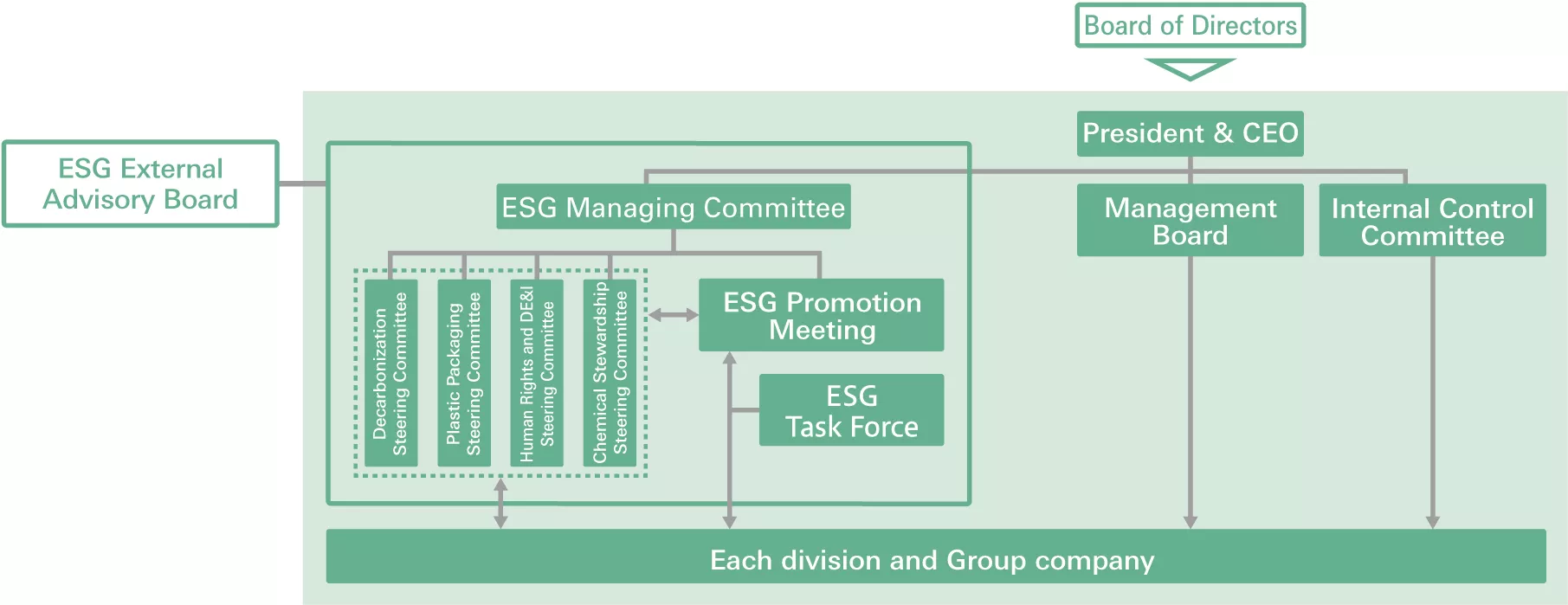
In May 2021, to reach its goals of zero carbon dioxide (CO2) emissions by 2040, and to become a carbon negative company by 2050, Kao has announced new decarbonization targets. Our mid- to long-term goal is to achieve these targets, and this has been certified by the global Science Based Targets initiative (SBTi) as a 1.5°C target. Kao is also a member of RE100, which is a global initiative bringing together the world's most influential businesses committed to 100% renewable electricity. Also, in April 2022, the 2021 decarbonization results were announced.

Results: 20% (2020: 15%)
● Reduce CO2 emissions (absolute value) throughout the product lifecycle*4 by 22% (taking 2017 as the base year) by 2030 Note: SBTi 1.5°C target certification
Results: 4% (2020: 4%)
Results: 38% (2020: 28%)
■Kao's newly unveiled Supply Chain ESG Promotion Guidelines
In June 2021, Kao announced its Supply Chain ESG Promotion Guidelines. Kao is working to disseminate the Guidelines for Suppliers' Assessment, which requires its business partners to demonstrate their social responsibility and concern for the environment. Kao is also confirming the status of compliance, including third-party audits. If there is a violation, appropriate measures will be taken, such as providing guidance to help suppliers make improvements, or discontinuing the business relationship. In addition, Kao has classified supply chains as high-risk if they have been affected by serious issues regarding human rights and the environment. Kao is working to identify the risks through on-site dialogue to determine the nature of the issues, and to work together with suppliers and NGOs to find solutions, and make public the progress that is made.
The guidelines for responsibly sourced raw materials, which includes Supply Chain ESG Promotion Guidelines, was reorganized in June 2022 in order for business partners to understand Kao's vision in procurement. The Guidelines for Suppliers' Assessment was recreated as the Partnership Requirements for Suppliers, based on the conventional Policies for Procurement. Kao added new requirements there, which includes the establishment of a diverse and inclusive working environment and the promotion of decarbonization across the entire product lifecycle. Kao also revised the Supply Chain ESG Promotion Guidelines and renamed it the ESG Promotion Activities with Suppliers, as well as revising and renaming the Guidelines for Sustainable Procurement of Raw Materials as "High-Risk" Supply Chain Management and Sourcing, which are available on the company's website.
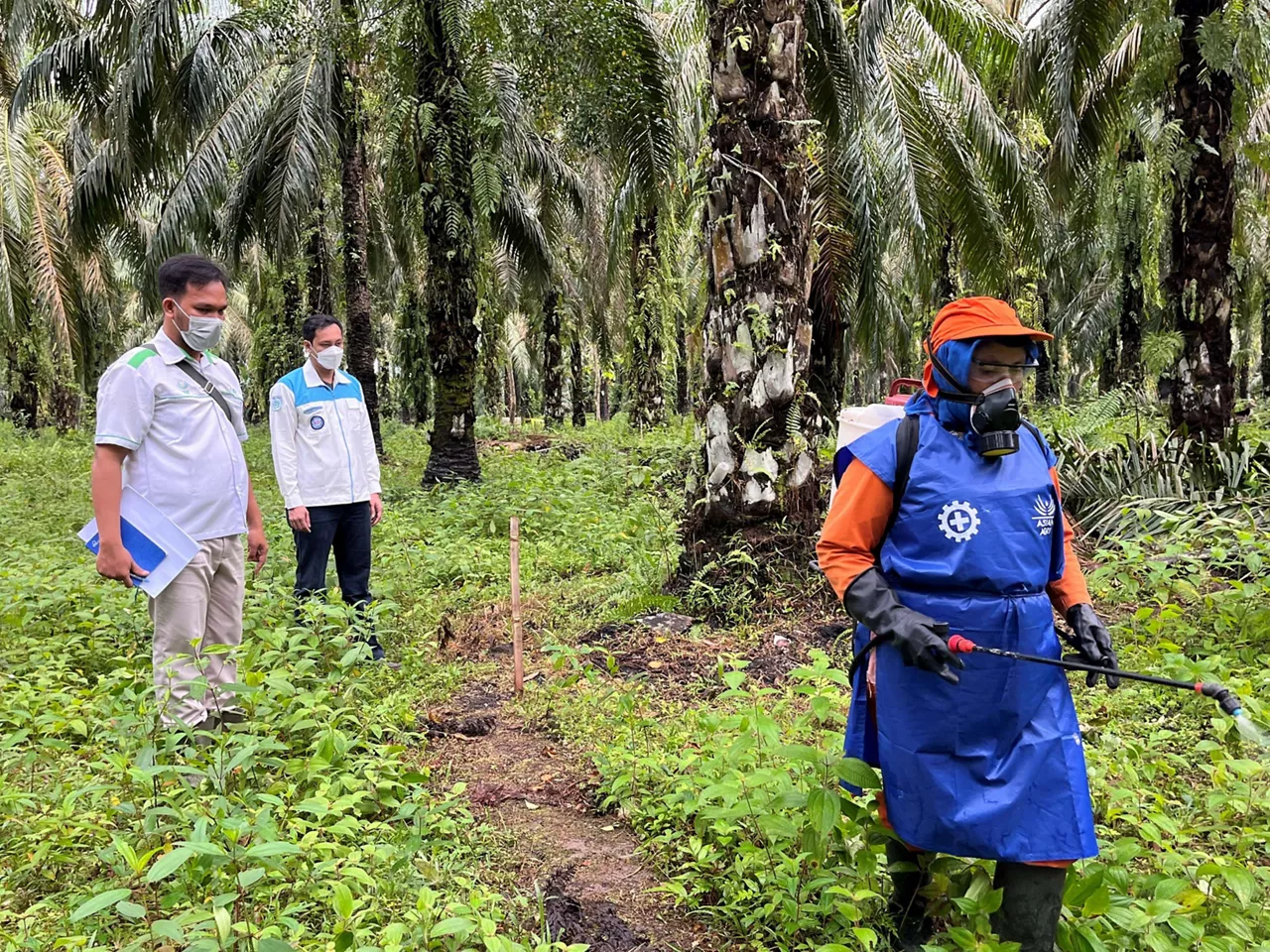
2021 Results
Results: 96% (2020: 94%)
● Confirm trackability to small oil palm farms by 2025
Results: completed up to own farms managed by oil and fat suppliers (2020: completed up to own farms managed by oil and fat suppliers)Zero Waste
Currently, Kao uses 106,000 tons of plastic for its packaging containers, of which 104,000 tons are fossil-derived plastic. By 2030, the amount of fossil-derived plastic used by Kao in packaging containers will pass its peak*6 . We aim to achieve Zero Waste*7 in 2040 and Negative Waste*8 in 2050. Kao aims to reduce the amount of plastic packaging containers used in its products, as well as in society as a whole*9 to 200,000 tons by 2030.
One of Kao's Innovation in Reduction is promoting the use of refill and replacement packs. As of December 2021, Kao Corporation has 380 refill and replacement products, with a conversion rate of 83%. In addition, the amount of plastic reduced with refill and replacement products is 77,000 tons compared to the case where all products were made using their original product container. Combined with the effect of concentrated products, around 139,800 tons of plastic were reduced, making for a reduction rate of 78.4%.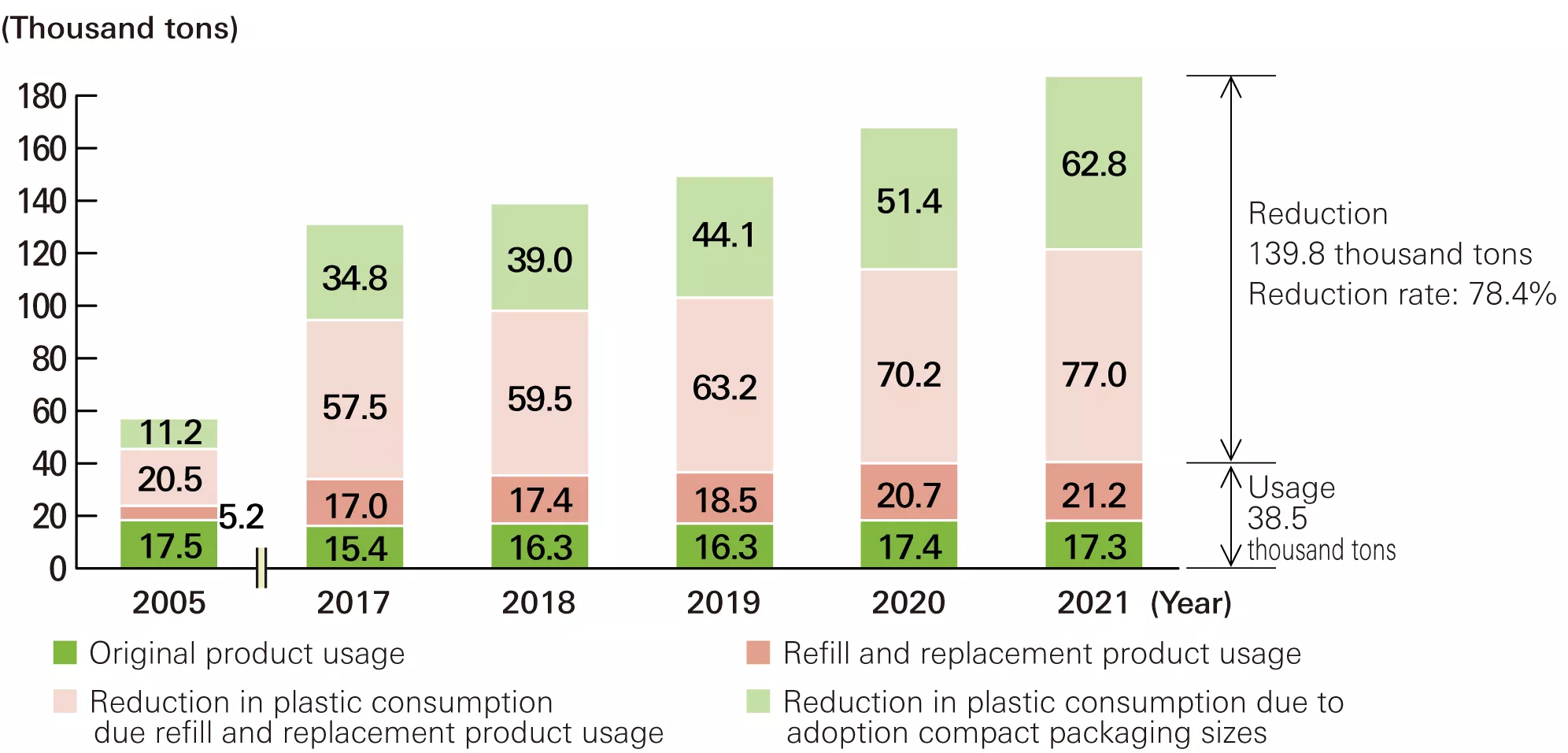

In 2021, Kao promoted a series of field tests in collaboration with other companies and organizations, especially in the area of Innovation in Recycling. Besides activities targeting packaging containers, such as horizontal recycling of refill packs and bottles and the utilization of chemical recycling materials in cosmetic packaging containers, projects were launched related to matters including the recycling of used disposable diapers and the development of the asphalt modifier which uses waste PET material, NEWTLAC 5000, etc.
(1) Making new film packaging from used ones: horizontal recycling from refill pack to refill pack
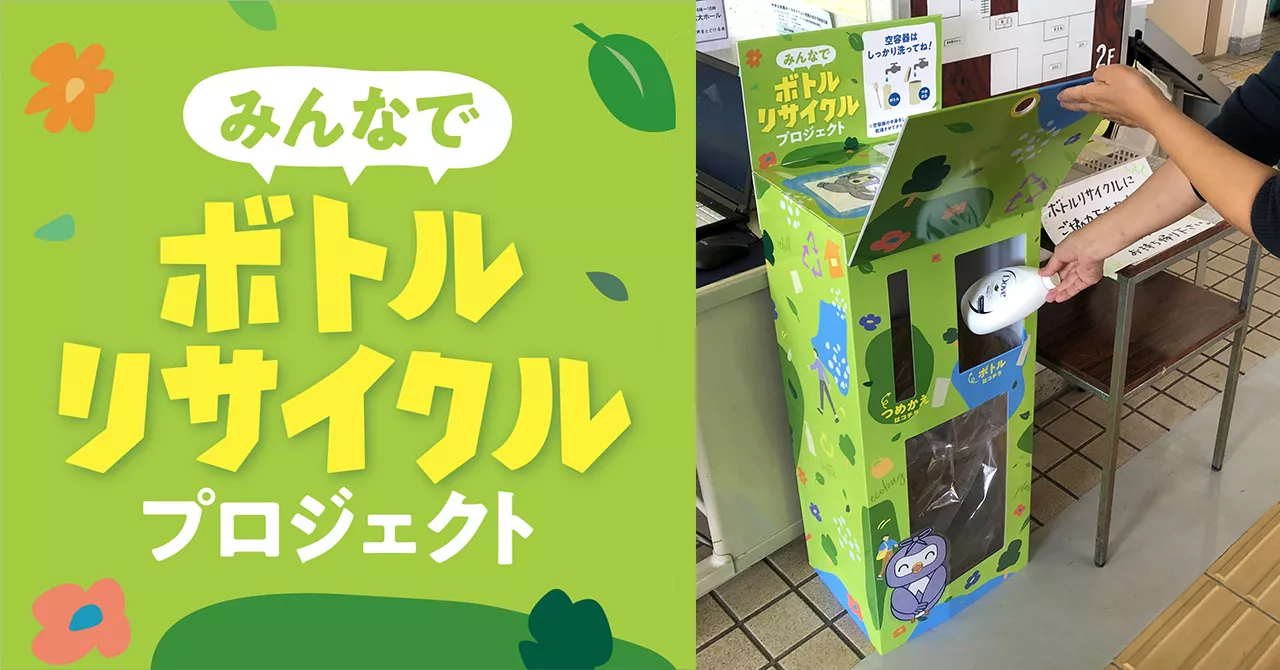
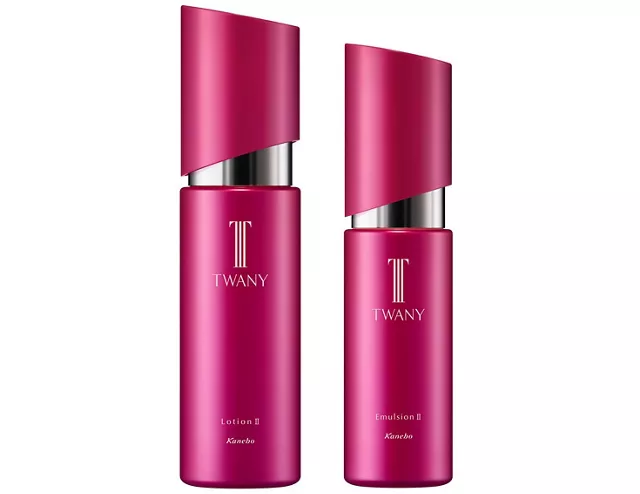
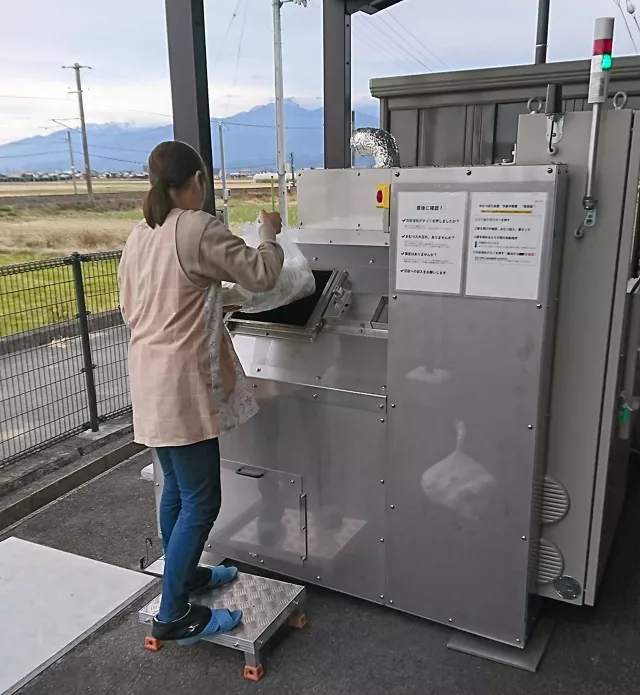
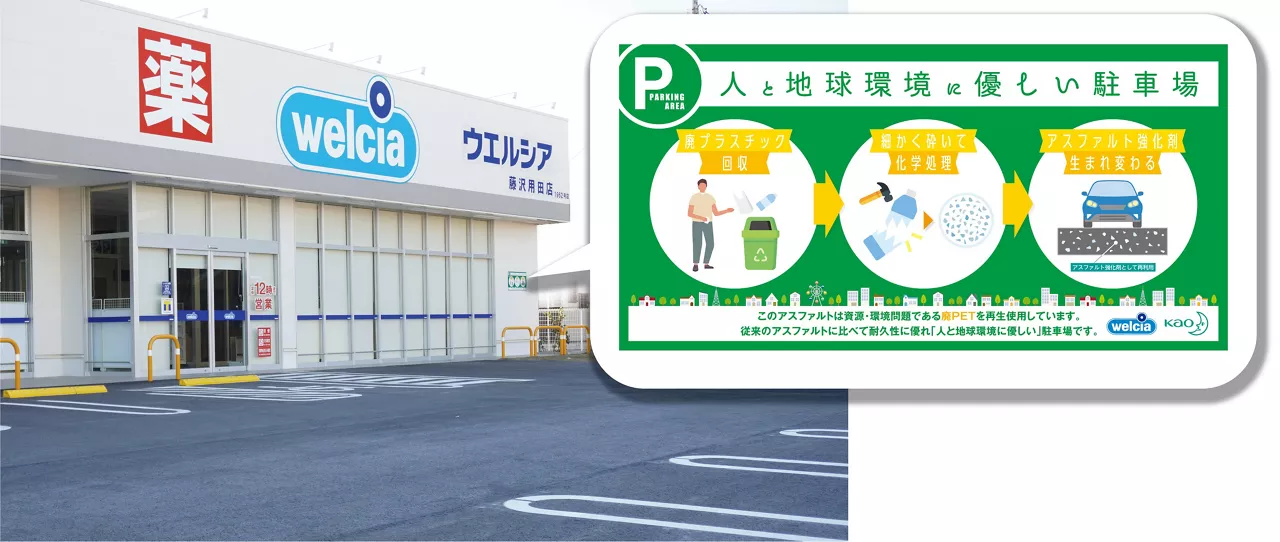
Results: 104,000 tons (2020: 116,000 tons)
● Expand the quantity of innovative film-based packaging penetration for Kao and others to 300 million per annum by 2030
Results: 11 million (2020: 7 million)
● Eliminate eye-catching plastic stickers by 2021
Results: 100% (2020: 73%)
● <New target> Increase % of recycled plastic in plastic packaging
* The target ratio to be achieved by 2030 is planned to be disclosed in 2023
Results: 1.3% (2020: 0.4%)
● Practically use and launch products of innovative film-based packaging made from collected pouches by 2025
Results: continued development (2020: continued development)
● <New target> Achieve 100% of recycled plastic used in PET containers (Japan) by 2025
Results: 19% (2020: 0%)
● <New target> Decrease ratio of waste from Kao sites* that cannot be recycled to Zero (less than 1%) by 2030
● <New target> Reduce discarded products and sales promotion materials (Base year: 2020) to 95% by 2030
Results: 14%
* All content is copyrighted by Industry Intelligence, or the original respective author or source. You may not recirculate, redistrubte or publish the analysis and presentation included in the service without Industry Intelligence's prior written consent. Please review our terms of use.




